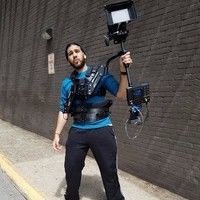I'm working on a short film for class and it will be about hackers. I need to show the computer screen. I'm unsure of what is the best way to go about this. Any suggestions? Thank you!

I'm working on a short film for class and it will be about hackers. I need to show the computer screen. I'm unsure of what is the best way to go about this. Any suggestions? Thank you!
1 person likes this
In my experience, a DSLR HD camera will pick up a computer screen just fine so long as it is not exposed to too much direct sunlight. Glares can pose a problem and the reflection of the camera on the computer screen can pose a serious issue as well. Some people might fix that problem in post though. I wish I weren't your only comment.
1 person likes this
Thank you Kelly. I will use multiple scene and test them out under various environment to see which one works best :).
1 person likes this
to me u will have to deal with the lighting and flickering........ it will be white at big apertures and 1/50s exposure may be decrease the brightness of the screen ..........
I was wondering, do people use green screens or is that too complex?
1 person likes this
A great program like deflickr from ReVisionFX will perfectly handle the flickering. Just make sure the white balance on your camera will be just right so that the computer screen is white enough; because some screens tend to be bluish. Wish you luck!
1 person likes this
Thank you all!!!
1 person likes this
LCD (Liquid Crystal Display) computer screens generally don't flicker or roll at normal digital exposure speeds. Flat computer screens are usually LCDs or an LCD varient. If you're using a CRT (Cathode Ray Tube) screen or other shutter speeds you may see rolling black bars or flicker in your image because the computer screen happened to be refreshing itself when your camera was making an exposure. This was a big problem before LCD screens. With CRT (Cathode Ray Tube) screens we had to analyze the the screen refresh rate, change the camera shutter angle to make sure it was open long enough, and literally synch the camera to the computer. It's a lot easier now. Expose for a normal exposure and set the computer's brightness level to a level where it looks good. And be sure to run a test with the camera and computer you plan to use.